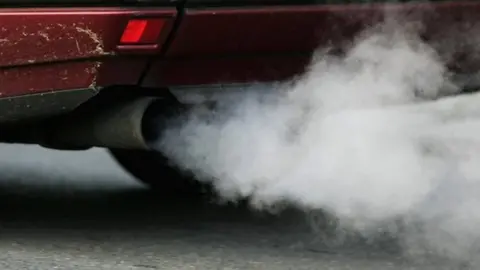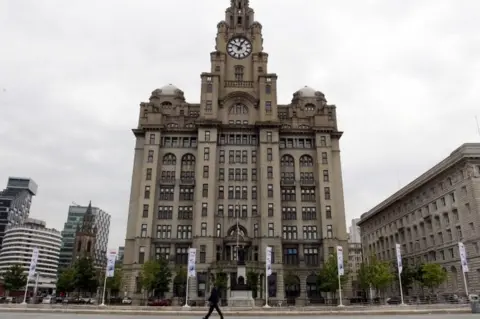Liverpool City Region's air pollution linked to 1,040 deaths per year
 Getty Images
Getty ImagesMore than 1,000 deaths a year in the Liverpool City Region can be linked to air pollution, scientists have said.
The King's College London study also suggested that the life expectancy of today's children could be shortened by up to five months if they are exposed to projected future pollution levels.
The report, commissioned by the British Lung Foundation, found road transport was the main cause of air pollution.
Liverpool City Council described the findings as "very worrying".
The BBC has asked the Department for the Environment for a response.
Researchers examined nitrogen dioxide levels and fine particulate matter - the most harmful forms of air pollution - and calculated that up to 1,040 deaths per year were linked to dirty air.
 Peter Byrne/PA Wire
Peter Byrne/PA WireThey said that if nothing is done to tackle the problem, it could result in the average child born in 2011 dying between six weeks and five months earlier than would otherwise have been the case.
Similar recent studies suggested 570 to 709 deaths each year were caused in Birmingham by pollution, while in Liverpool the predicted toll was 1,459.
In 2018, Liverpool was named alongside Manchester and London in a list of more than 40 UK towns and cities that were at or had exceeded air pollution limits set by the World Health Organization.
Liverpool City Council has submitted an outline business case to introduce a clean air zone to the government.
'High congestion'
Zak Bond, of the British Lung Foundation, said: "We need politicians to take fast action to remove the dirtiest vehicles from the most polluted roads."
Dr David Dajnak, principal air quality scientist at King's College London, said: "People's lives are being cut short and, notably, the most vulnerable could benefit the most from immediate actions to reduce air pollution."
Laura Robertson-Collins, Liverpool City Council's cabinet member for the environment, described the report as "very worrying".
She said the council was "taking steps to reduce air pollution".
As well as bidding to establish a clean air zone, she pointed to a £47m programme of roadworks designed to reduce congestion and improve air quality.
